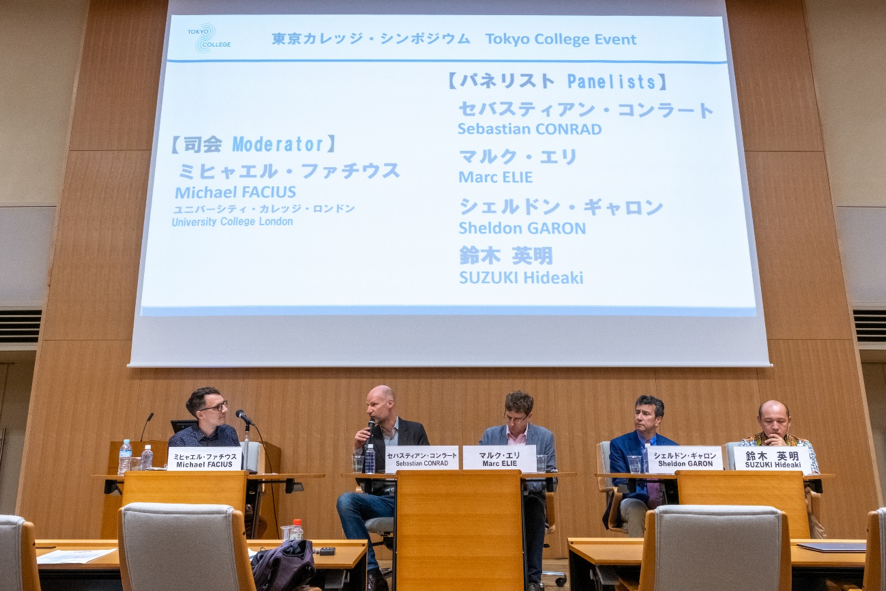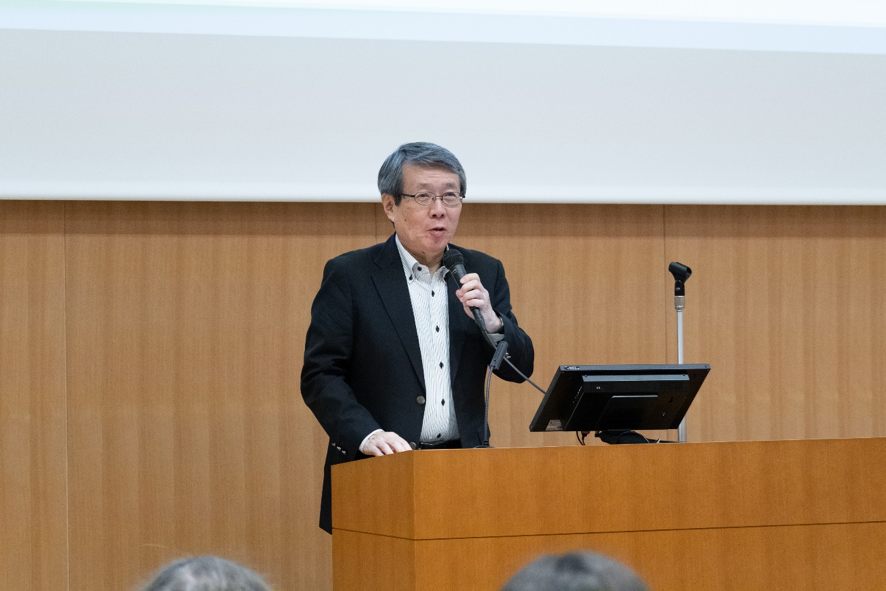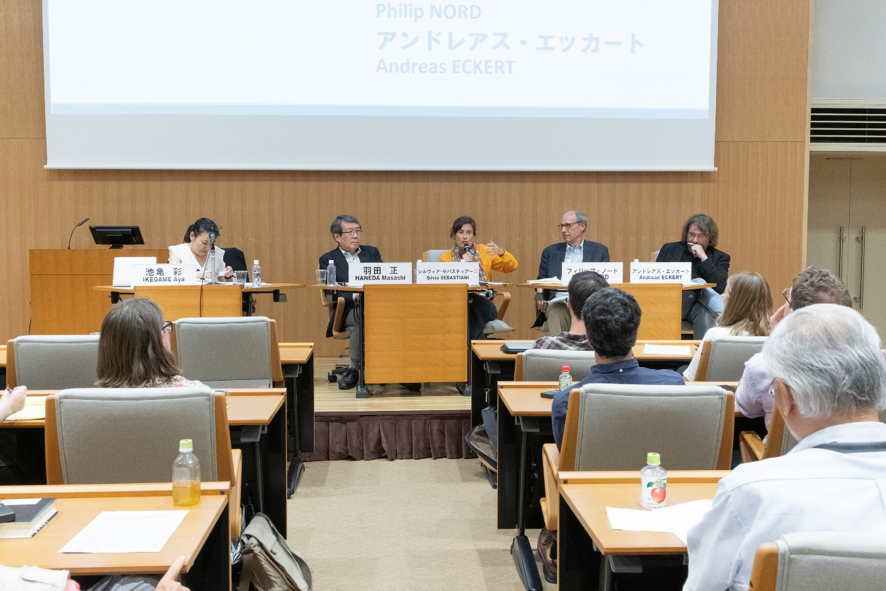Tokyo College Event “Global History” 1.Why Do We Need Global History? 2.Global History of Identity
Tokyo College held a symposium titled “Why Do We Need Global History?”
On the afternoon of September 2 (Monday), 2019, Tokyo College held a symposium titled “Why Do We Need Global History?” The moderator was Dr. Michael Facius (University College London), with Professor Sebastian Conrad (Berlin Free University), Dr. Marc Elie (École des Hautes Études en Science Sociales), Professor Sheldon Garon (Princeton University), and Dr. Hideaki Suzuki (National Museum of Ethnology) taking the stage as panelists.
Professor Masashi Haneda (Tokyo College) explained the purpose of the symposium, and then the four panelists discussed the necessity of global history from their respective points of view after introductions from moderator Dr. Facius.
First, Professor Conrad, who conducts research relating to the history of Germany, Western Europe, and Japan, cited German nationalism as an example of nationalism shaped by global factors and—while stating the necessity of understanding the history of each nation from a global perspective—argued that globalization does not mean the end of national history.
Dr. Elie, who researches environmental history and pedology of the Soviet Union and Kazakhstan, used a global history approach to analyze the history of environmental science during the Cold War. He proposed that global history is necessary in order to shed light on how the eastern and western blocks confronted and cooperated with each other in a world separated by the Cold War, and on the fact that cooperation did take place due to competition.
Next, Professor Garon—who has written a great deal about modern Japanese history, comparative, transnational, and regional history, and the history of the Second World War in Japan, Germany, and the United Kingdom—explained the commonalities and differences between transnational history and global history. Using the example of savings, the theme of his own research, he then stated that by taking a bird’s-eye view of Japanese history and carrying out comparison and analysis from a broad perspective, connections to Europe, America, and various regions of Asia become apparent.
Finally, Dr. Suzuki, who specializes in the history of the Indian Ocean, positioned global history as one reaction to present borderless world and observed the fact that, although it has become easy to imagine a borderless globe or world nowadays, all kinds of borders do still exist. He also raised the concept of networks in maritime history, and argued that global history is effective in the reexamination of the idea of “boundaries” as well as the exploration of connections between ourselves and the world.

In the second part of the symposium, a discussion was held with questions from the floor. First, discussing the nature of connections that exist between the panelists respective areas of research, Dr. Elie noted that each presentation questioned national borders and boundaries, and Dr. Suzuki reviewed the demarcation of space used in conventional historical research, stating that how to come to a new understanding of the world is an issue going forward. Furthermore, there was an active exchange of views on the relationship between history and politics as well as the problem of general outreach more broadly, in terms of museum exhibitions and education, with recognition of issues in the academic circles of Japan, Germany, France, and America, respectively.
Tokyo College held a symposium on the “Global History of Identity.”
On the afternoon of September 4 (Wednesday), 2019, Tokyo College held a symposium on the “Global History of Identity.” The moderator was Dr. Aya Ikegame (University of Tokyo), with Professor Andreas Eckert (Berlin Humboldt University), Professor Silvia Sebastiani (École des Hautes Études en Sciences Sociales), Professor Philip Nord (Princeton University), and Professor Masashi Haneda (Tokyo College) taking the stage as panelists.
First, Professor Haneda explained the purpose of the symposium, proposing that collaborative research in a global context be undertaken on identity, a term that is commonly used in discussion of political and social issues. The four panelists discussed identity, following introductions from moderator Dr. Ikegame.

First, Professor Haneda, who researches world history and global history, has questioned how “identity” has come to be used as a universal concept in traditional research around the world, and wondered whether, for example, there might be differences in what is meant by “identity” in English and Japanese, or Spanish and Japanese. He also set out the particulars of how the word “identity” was introduced into Japan in the 1960s, and its development thereafter.
Professor Sebastiani, an expert on the Scottish Enlightenment, then emphasized that in 18th century Scotland “identity” (which derives from the Latin word “idem”) was used with a meaning that contrary to that of the modern era, in which the word is used with a sense of “not the same,” and in which “diversity” is thought of as identity. She stated that the questions of how the countries of Europe came to have their own unique characteristics while sharing a common path, what ties us together, and what distinguishes us, and relationship of tension between universalism and particularism continues even now.
Professor Nord, who specializes in modern French politics and cultural history, then mentioned several books including Erik Erikson’s Identity, Youth, and Crisis (1968), Fernand Braudel’s L’identité de la France (1986), and Pierre Nora’s Les lieux de mémoire: La République (1984), and pointed out that the concept of identity was originally applied to individuals in psychoanalysis but this application was transferred to groups in historical analysis; Professor Nord analyzed what we have gained and what we have lost from this maneuver.
Finally, Professor Eckert, who researches global history centered around African history, introduced two case studies of identity in Africa. The first example concerned how the ethnic massacre that took place in the capital of Rwanda on April 6, 1994. Professor Eckert explained that this was an atrocity prepared by a modern institution of government that went beyond conflicting cultural differences, and that it indicated a more solidified ethnic identity. Professor Eckert took the model of multi-ethnic nationalism in Ghana, which became independent in 1957, as his second example, and stated that national identity is ambiguous.

In the latter part of the symposium, there was a discussion with questions from the floor. Moderator Dr. Ikegame asked questions concerning how to think about the current political landscape around identity. The panelists pointed out that identity materializes and becomes real through history, at the same time as being something that is constructed through history, and that people act on the basis of identity. The discussion continued on to whether it is possible for the global history methodology to be used to strengthen an identity as global citizens, and a range of questions were raised concerning opinions on whether a distinction should be made between “identity” in the academic world and “identity” as used by activists, and whether we can bundle a variety of themes such as Japanese nationalism, the Scottish Enlightenment, and the massacre in Rwanda together with questions of identity or whether there might be more appropriate expressions.
| Date(s) | September 2nd (Mon) & 4th (Wed) 2019, 3:00-5:00pm (2:30 pm Doors Open) |
|---|---|
| Venue |
Sanjo-kaikan Hall, The University of Tokyo (Hongo Campus) each day |
| Registration | Pre-registration required (90 seats available each day -First come, first served) |
| Language | English and Japanese (Simultaneous translation available) |
| Organized by | Tokyo College, The University of Tokyo |
| Contact | tcevent@graffiti97.co.jp |












